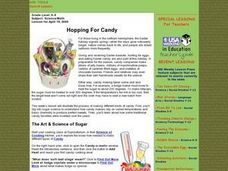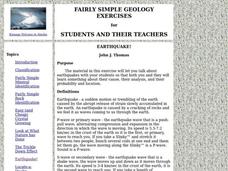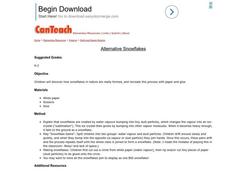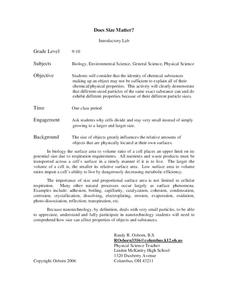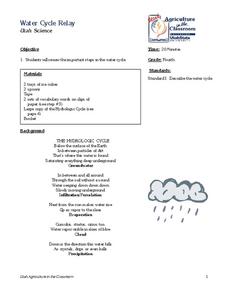Curated OER
Cold, Clouds, and Snowflakes
Students explore satellite data and graphing. In this weather data analysis math and science instructional activity, students analyze NASA satellite data to draw conclusions about geographical areas where precipitation might have...
Curated OER
It's Raining, It's Pouring: The Water Cycle
Learners investigate the relationship of the steps in the water cycle, and create a simulation of the water cycle in a jar.
Curated OER
Gelatin Volcanoes
Students investigate magma flow using gelatin volcano models. In this earth science instructional activity, students sketch the magma bodies as observed from the top of their model. They explain why magma moves that way.
Teach Engineering
Organic Solar Energy and Berries
You can eat a solar cell? A unit on solar energy begins with a discussion about organic solar cells, followed by directions on how to build your own. After following the teacher's directions to build an anthocyanin dye-sensitized solar...
Curated OER
Summarizing: James and the Giant Peach
Text marking and a T-chart format to distinguish important information from trivia help elementary readers summarize effectively. Encouraging readers to construct a chapter summary from paragraph-level topic sentences is another sound...
Curated OER
Build a Rain Gauge
Learners use a glass container, coat hanger, measuring spoons, and more to make their own rain gauge. In this rain gauge lesson plan students measure the rain.
Curated OER
How Are Rocks Formed?
Students identify types of rocks. In this geology lesson, students view animated graphics to identify how sedimentary, igneous, and metamorphic rocks are formed. Students take a rock quiz to show how different rocks are formed.
Curated OER
Alternative Snowflakes
Students discover how snowflakes in nature are really formed, and recreate this process with paper and glue.
Curated OER
Rock Hounds
Young scholars receive a basis for understanding the three main classifications of rock: igneous, sedimentary and metamorphic. They engage in a hands-on activity designed to give them an appreciation for rocks and minerals.
Curated OER
Beanie Baby
Students will explain the importance of soybeans. In this science activity, students participate in making a "beanie baby" necklace. Additionally, students observe their soybeans for germination and growth for 7-10 days. Students record...
Curated OER
Minerals of the Earth
Students learn and practice identifying Earth's minerals and their properties. Working in small groups, they evaluate minerals. This is a well-described lesson, which students enjoy.
Curated OER
Cloudy With a Chance of Meatballs
Fourth graders participate in an activity which introduces them to common types of precipitation. They examine "Cloudy With a Chance of Meatballs" through a teacher read aloud and make a weather pamphlet.
Curated OER
Hopping For Candy
Students explore recipes online for different types of candy, and simulate process of making candy to explain how candy makers rely on varied temperatures and basic chemistry to produce perfect sweets.
Curated OER
Stalactites And Stalagmites
Learners conduct a scientific investigation about the formation of stalactites and stalagmites. They conduct an experiment to reproduce them in the lab environment. Students make observations over a period of time in order to see the...
Curated OER
Dirt: Making Dirty Water Clean!
Fourth graders study soil and water. In this water lesson students work in groups and use a filter to clean water.
Curated OER
Salty Sea Water
Learners conduct an experiment to find out if there is salt in the ocean. In this scientific inquiry lesson, students pour a cup of salt water onto an aluminum plate and observe the changes over a few days. Learners complete an included...
Curated OER
Earthquake!
Young scholars study causes, probability and location of earthquakes. They complete a number of activities and look at web pages to examine the characteristics of earthquakes.
Curated OER
Cotton Seed Planting
Students using scientific inquiry will observe and record in daily journals their findings on cotton seeds. They measure, graph, and then communicate their discoveries about plants to each other.
Curated OER
Alternative Snowflakes
Students discover how snowflakes in nature are really formed, and recreate this process with paper and glue. This art activity gets some scientific learning in as well.
Curated OER
What is in Soil?
Fourth graders identify and examine the components that make up soil. Individually, they use a magnifying glass to identify the organic and inorganic material in their soil sample. To end the lesson, they record the differences in the...
Curated OER
Does Size Matter?
Young scholars explore the surface area to volume ratio in cellular respiration. While participating in an interactive lab experiment, they examine proportional surface area and discuss nanotechnology. Students observe the...
Curated OER
Water Cycle Relay
Fourth graders study the water cycle in nature. For this water cycle lesson, 4th graders review the hydrologic cycle by reading the poem. Students then study a picture of the hydrologic cycle and fill in the blanks with the missing...
Curated OER
Observing Osmosis in a Chicken Egg
Tenth graders develop a hypothesis and explain what they observed on an activity. For this investigative lesson students observe osmosis and report their data using a graph.
Curated OER
Where Does Radon Come From?
Pupils discuss the differences between the three types of rocks and how radon can escape from the rocks themselves. They analyze other sources of radon in the environment. They work together to complete an activity and worksheet.
Other popular searches
- Growing Crystals Borax
- Growing Crystals Charcoal
- Growing Crystals Salt
- Growing Crystals K8
- Growing Crystals Nacl
- Growing Crystals Projects
- Week Long Growing Crystals
- Easy Growing Crystals
- Growing Crystals Nail
- Recipe for Growing Crystals














